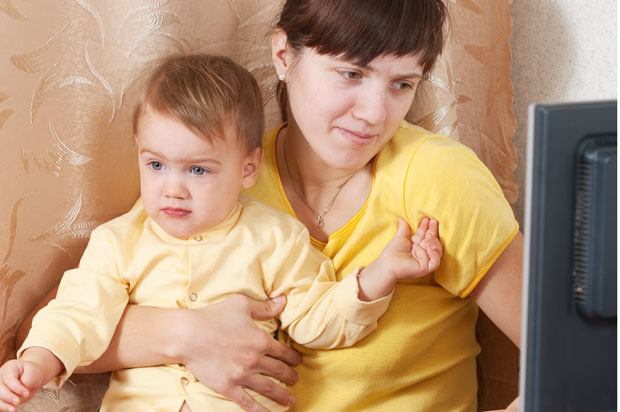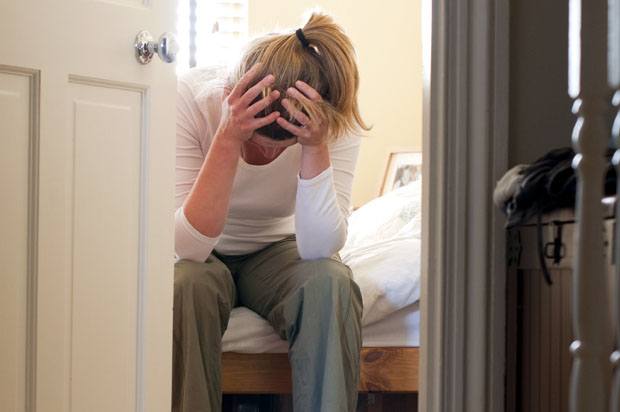Young mums
Being a young mum can be daunting, especially if you're worried about money or how to look after yourself throughout your pregnancy. The Mix looks at some of the issues you may face.

"Stop wriggling! I'm trying to read The Mix."
It’s often presumed that if you’re a young mum it was all a horrible accident, when in fact, many make the choice to start a family at a young age. At the same time, unexpected pregnancies aren’t a problem unique to young mums – around 40% of women have unplanned pregnancies due to problems with contraceptives, or simply because they got carried away in the heat of the moment.
If you’re a young mum, you will no doubt share many of the same problems that older women face in pregnancy, but money, housing and health issues could be more of a concern.
Health and exercise
If you suspect you’re pregnant it’s best to get medical advice as soon as you can. Doctors and midwives aren’t allowed to share personal information with anyone without your permission, whatever age you are.
“Even if the news of your pregnancy comes as a happy one, often one of the major causes of antenatal depression is the worry over where you’re going to live with your new baby, how you’re going to feed yourself, and how you can keep yourself healthy,” says midwife Cindy Hutchinson, who’s working with Tommy’s, the baby charity, on a project about teenage eating.
If you’re pregnant or have a child under the age of four, you’re under 18, or you or your family are on benefits (Income support, Job-seeker’s Allowance or Child Tax Credit), you may be eligible to sign up to the Government programme ‘Healthy Start’. This will enable you to receive vouchers you can exchange for milk, fresh fruit and vegetables, infant formula and vitamin supplements.
Exercise will help you feel good about yourself and will enable your body to prepare for labour, birth and the demands of a newborn baby. Women’s joints go through lots of change during pregnancy because the body produces the hormone relaxin. Because of this, your joints become loser and this means there’s more risk of doing damage so it’s important you avoid contact or high impact sports. Instead, do gentle exercise like swimming, walking or yoga to minimise any jolts to your bump, and make sure you drink plenty of water.
Smoking
If you smoke during your pregnancy, your baby is more at risk of being born smaller or prematurely. This is because smoking raises the level of carbon monoxide in your bloodstream, which reduces the amount of oxygen available to your baby. It’s also been shown that the impact of smoking on brain development and on the general health of your baby can last into childhood, and even later in life. “The focus for helping young mums give up smoking should include helping them to sort out the stressful things in their lives that lead them to smoke in the first place,” says Cindy.
It’s natural to feel guilty about something you may have done, or not done, in your pregnancy. “Many of the unpleasant things that happen in pregnancy aren’t necessarily related to things that women do, or don’t do,” says Cindy. “The best attitude for women who know they didn’t have the healthiest lifestyle until they found out they were pregnant is to say that from now on they’re going to do the best they can to be healthy.”
If you’re worried you’ve done something to harm your unborn baby, speak to a professional who can talk you through your concerns and any possible problems. It may be that you have no need to worry, or if there are potential issues, additional tests can be carried out to make sure everything is OK.
Housing and education
It doesn’t matter what age you are when you get pregnant, you’re still going to have the same responsibilities regarding motherhood. But if you’re a young mum, this can be much harder. There may be pressures at school or college and decisions you have to make about your career. If you’re under 20, you may be eligible for the Care to Learn Grant. This will help pay for childcare and extra costs.
Even if you’ve received positive responses from your partner and parents, you may have to move out simply to get a bigger place for you and your baby to live. It isn’t always easy to make ends meet on your own, so it’s important you get the right information about benefits and housing entitlement.
Family support
Don’t be scared to ask questions. Asking people for advice shows you’re interested and want to make the best choices for you and your baby. “Parents or family members should also see this curiosity as a positive thing,” says Cindy. “If you explain your reasons for asking, they may be more likely to be supportive.”
It’s hard for women of all ages to imagine what it’s like to have a baby. Annie was 18 when she fell pregnant: “My family were very surprised, but once they got over the initial shock they were really supportive and listened to what I wanted to do, rather than telling me what to do.”
Often young people are faced with a barrage of criticism for getting pregnant from their family, friends, and even from the media. “Strangers would look me up and down, especially when I got bigger as I think they thought I looked too young to be a mum,” says Annie. “All I could do was reassure myself that I knew I was strong enough to do it and it didn’t matter what other people thought, my family’s support was more important.”
Next Steps
- Chat about this subject on our Discussion Boards.
By
Updated on 29-Sep-2015
Photo of mum and baby by Shutterstock.
No featured article










